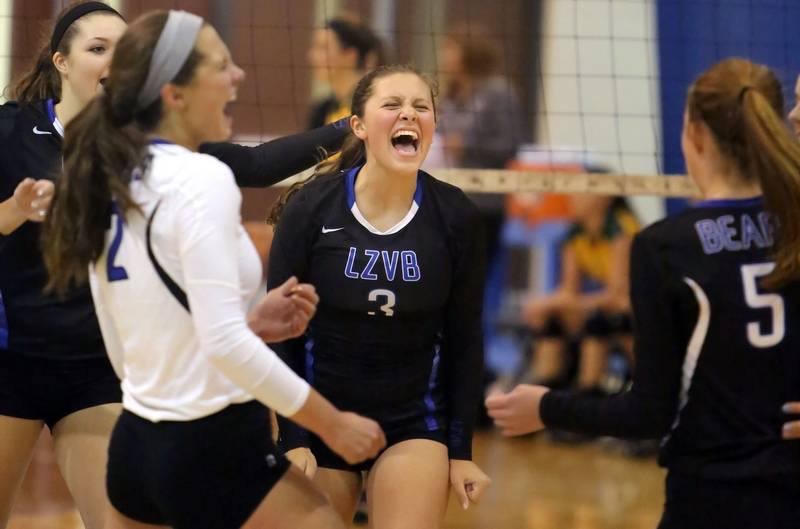Defined by resilience: one athlete’s journey to recovery
December 11, 2017
Imagine working towards achieving one goal since the beginning of your athletic career. Practicing late after school, canceling plans to better your game, dreaming of going collegiate, all since you were child. Now imagine all of that being put under threat by the looming shadow of an injury that could possibly end your career forever.
Forced to sit on the sidelines due to the discovery of a threatening injury, Kylie Dykgraaf, senior volleyball player, realized just how much she truly loved her sport. Despite wanting more than anything to be on that court, Dykgraaf said, her injury pushed her to take a step back and look at her passion from a different approach.
“I started to work on things like my mental game or really just getting a better read of the ball,” Dykgraaf said. “It’s not the same. More than anything I want to play and I still, to this day, am challenged by my drop foot and the people who doubt me because of it. But my injury doesn’t define or take away from who I am as a player, no matter how much mental or physical pain it cost me.”
It’s hard to imagine Dykgraaf suffering from the exhaustion of what Kylie called an extremely painful injury as coaches and friends present her to be a picture of constant delight. According to Dykgraaf, many of her coaches call her “Smiley Kylie” and she’s known to be found laughing practically 24/7.
“The obstacles she faced seemed unreal,” Katie Guy, senior and longtime teammate, said. “It was honestly amazing for me to see her hide the pain and persevere every single day. She was truly the strongest person she could be throughout the experience.”
But it was hard to be the energetic, enthusiastic, outgoing person her friends saw her as, Dykgraaf said, when battling the physical and mental strain placed onto her body.
The mental repercussions of her treatment were invisible to many of her teammates and coaches, according to Guy.
“I know now that she was very sad throughout the experience,” Guy said, “but I couldn’t tell how she was feeling in public. She always acted like there was nothing wrong. She was always laughing. I don’t know how she did it but it is insanely admirable.”
Dykgraaf’s taxing treatment was the only solution for her injury, commonly known as “drop foot”, she said. The condition entails an inability to lift the front part of the foot and stems from weakness or paralysis of the muscles that lift the foot, often leading to more problems as it did for Dykgraaf, who eventually had to undergo hip surgery. Prior to her injury, Dykgraaf says she liked spent her time hanging out at the movies or grabbing a bite to eat with her teammates. After her surgery, however, Dykgraaf gave up much of her free time to try and get stronger for volleyball again.
“I do a lot of conditioning and physical therapy,” Dykgraaf said. “I see it as a way for me to get myself working better on the court but also just feeling better in general.”
Dykgraaf eventually embraced volleyball in its entirety after extensive surgery and numerous visits to the hospital. Routine therapy and knowing her limits, Dykgraaf said, helped her play sooner than the two and a half years doctors predicted. Now, almost fully healed and set to play volleyball in college, Dykgraaf continues to carry the lessons her injury taught her.
“Being and [not being] in a team sport made me realize how big of an impact I can have. My energy and negativity can spread like fire. I remember one time I was doing some footwork with the younger kids and I was going a bit slow since it was my first day back from [being injured], but I looked around and saw that they were copying my every move,” Dykgraaf said. “ I wanted to make sure I wasn’t seeing things, so I moved faster and they did the same thing. I continued to go faster to push them them to get better. One team member wrote me a card because of it. They told me to feel better and opened up about how I inspired them to work harder and it was exciting to see how I could do something so much more as just a volleyball player.”
Situations such as the one with her younger volleyball players helped Dykgraaf pinpoint just why she loved volleyball so much. While the physical rush and competitive nature of the game may be the driving point of her passion, volleyball also taught her how to prioritize others in her life and showed her what she really cared about was making other people feel better, she said.
“I’ve always been the kind of girl who tries to make sure others feel okay, no matter how big or small their issue. Volleyball actually kind of helped me realize I want to become a sports psychologist since I could improve athletes’ mental games and make them happier in this process,” Dykgraaf said. “It just kind of hit me when I ran into a girl crying outside of the gym saying how she had to quit the sport she loved. I sat and talked with her the whole rest of practice and she ended up playing the last few minutes with a smile on her face. It was such a rewarding feeling and now I always want to do that, because I know how it feels to have something you love temporarily taken away from you.”
Her desire to help others is evident in every facet of her life. When she can’t play, Dykgraaf says, she sits and helps the team by working on setting volleyballs against the walls. When not playing with the girls, she’s managing the boys just to help more people and be around the sport more. It’s with this empathetic attitude that she tries to approach every problem she deals with, Dykgraaf said.

“I’m all about spreading smiles and positivity everywhere I go,” Dykgraaf said. “And I get to experience things I never would have through clubs like student council, interact, and class board, which are all focused on doing things to help others.Volleyball taught me people can always learn something from you and you can always help others, and I have so much fun doing just that.”
Dykgraaf feels indebted to volleyball due to all the important lessons it has taught her, and she feels no regrets in her decision to dedicate the next four years of her life to college as a volleyball player
“My coach tells us some pretty bad jokes and puns every once in awhile,” Dykgraaf said, “but other than that, there’s not much I can say I don’t like about this game. I play through pain since the happiness I get from being on the court overrides that painful feeling. I am completely in love with it and my team is my second family. I couldn’t imagine my life having turned out any other way.”

Rick Buskill • Dec 11, 2017 at 10:00 am
I’m Kylie’s Great Uncle and what an inspiration she is for our entire family. She and her Mom have put in endless hours of training and therapy so she can still reach above her ability and make her dreams come true. Merry Christmas to all.
Your loving Uncle
Rick Buskill